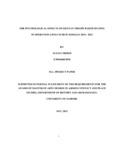| dc.description.abstract | The former United Nations Secretary General Dag Hammarskjold (1905-1961) once said that,
“peacekeeping is not a job for Soldiers, but only soldiers can do it”.1 This is because, the military
personnel are trained to conduct combat operation and undertake many other functions such as
stability and relief operations.2 While this assertion is true that the military has unparalleled
capabilities to accomplish some of the most difficult tasks, these operations present the soldiers
with significant challenges that often lead to serious psychological impact that current
mitigation and identification support systems such as the military command and chaplains may
not optimally perform.
The study examines the nature of Kenyan intervention in Somalia and the psychological
trauma arising from hot pursuit of Alshabab among the first contingent of Kenya Defense Forces
(KDF) troops in Somalia. It begins on the premise that ‘psychological impact of peacekeeping
operations have not been subject to much analysis among peace practitioners and military
officials in Kenya. In spite of Kenya having served in several peacekeeping missions - in a range
of countries - including the war torn Somalia. Therefore, not much has been documented on the
plight of Kenyan troops in such missions.
This study attempts to put into perspective the traumatic and psychological effects during the
operation on the first contingent of Kenyan troops in Somalia 2011-2012. The study uses both
the psychological and historical lens to explore some ramifications and lasting implications of
peacekeeping operations on Kenyan soldiers in Somalia. The project paper is particularly
concerned with the psychological effects among the first contingent of troops during
peacekeeping and peace enforcement following the incursion of Kenya Defense Force (KDF)
into Somalia in pursuit of Al-Shabaab on 14th October 2011.
The central thesis of the study is to examine the psychological effects among Kenyan troops. The
study also seeks to determine the role of KDF intervention in Somalia. In the preliminary
chapters, the study highlights the historical background of Kenya’s engagement in peacekeeping
1 Robert M. Perito, Guide For Participants in Peace Stability and Relief Operations, United States Institute of peace
Press, Washington, DC 2010, P.279.
2Ibid.
vi
operation since 1973. It then examines the Somalia conflict and how armed militia groups have
thrived in the war torn and stateless nation. One such group is Al-Shabaab which prompted the
KDF intervention. The study then looks at the Kenya’s military intervention in Somali, the
challenges troops encountered and how the operation experiences resulted in psychological
trauma, hence the subject of the study, which is investigated in the next chapter. In chapter four
the study examines the psychological effects among troops that arose from the intervention.
Finally the study discusses the management of the psychological effects arising from the
operations.
The study involved both library and field research. Field data was collected through oral
interviews, focused group discussion and questionnaires. Observation was used to capture non
verbal cues that enriched the study. Where necessary, research assistants were involved.
Collected data was grouped, collated, analyzed and presented using qualitative techniques.
The study concludes that the first Kenyan contingent to enter Somalia experienced both positive
and negative psychological effects during these operations. The negative psychological effects
arose from the stressors during pre-deployment and deployment phase. The major included: the
crowded and austere living conditions, harsh weather, high workload, mission uncertainty and
concerns about the family. | en |

